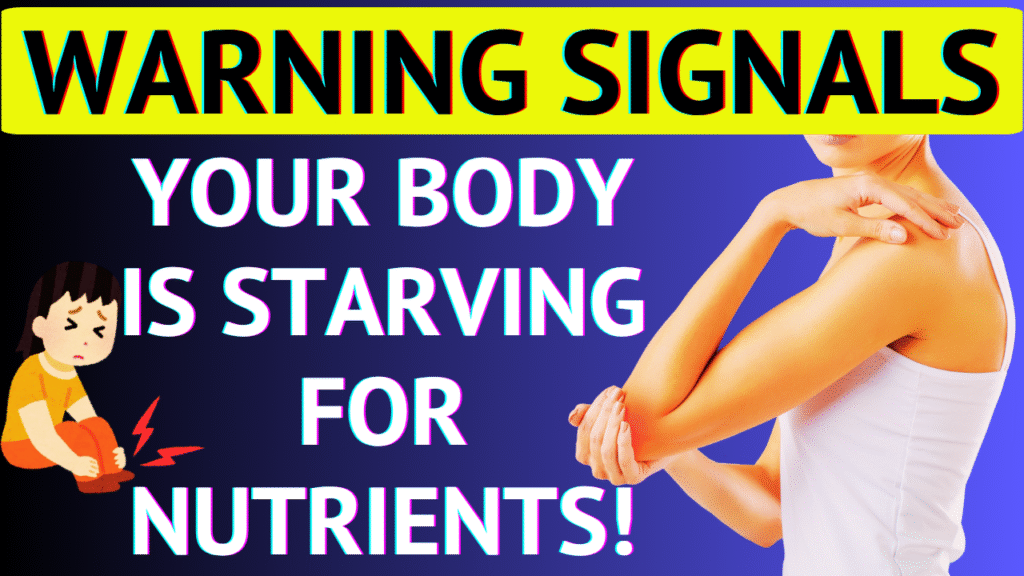
Feeling unusually tired or off lately? It might be more than just stress or lack of rest—your body could be signaling a deficiency in essential nutrients.
Nutrient shortages are more widespread than you might think. They can impact your energy, immunity, mental sharpness, and general well-being. Below are 12 signs that might indicate you’re running low on certain vital nutrients—and how to fix it.
1. Persistent Tiredness
Feeling exhausted despite getting enough rest? You could be low on iron, which is crucial for carrying oxygen in your blood. Without enough, energy levels dip.
What to eat: Red meat, lentils, spinach, or iron-enriched cereals.
2. Weak Nails or Thinning Hair
If your nails break easily and your hair lacks life, it may point to a biotin (vitamin B7) deficiency, which supports healthy skin, hair, and nails.
What to eat: Eggs, whole grains, almonds, and sweet potatoes.
3. Cracks in the Corners of the Mouth
Sore or cracked skin near the lips can suggest a lack of B vitamins, especially riboflavin.
What to eat: Leafy greens, dairy, eggs, and fortified breakfast cereals.
4. Muscle Cramps
Frequent cramps could signal low levels of magnesium, calcium, or potassium—minerals vital for muscle function.
What to eat: Bananas (potassium), yogurt (calcium), and almonds (magnesium).
5. Trouble Seeing at Night
Poor night vision could be linked to a vitamin A deficiency.
What to eat: Carrots, dark leafy vegetables, and sweet potatoes.
6. Tingling Sensations in Limbs
Tingling in your hands or feet may be due to a vitamin B12 shortage, which is essential for nerve health.
What to eat: Dairy, seafood, eggs, or fortified plant milks.
7. Slow Healing Wounds
If small cuts or bruises take forever to heal, you might be low on vitamin C, which supports tissue repair and the immune system.
What to eat: Bell peppers, citrus fruits, and strawberries.
8. Frequent Illness
Regular colds or infections may signal a need for more zinc, a mineral key to a strong immune system.
What to eat: Chickpeas, cashews, shellfish, and pumpkin seeds.
9. Pale or Dull Skin Tone
A washed-out complexion might mean low levels of iron or vitamin B12, both important for red blood cell production.
What to eat: Leafy greens, lean meats, and fortified foods.
10. Bone Weakness
If your bones feel fragile or ache easily, it might be due to a lack of vitamin D or calcium.
What to eat: Dairy products, canned salmon (with bones), tofu, and get safe sun exposure.
11. Mental Fog or Poor Focus
Struggling to think clearly? A lack of omega-3 fatty acids could be affecting your brain health.
What to eat: Fatty fish (like salmon), walnuts, flaxseeds, and chia seeds.
12. Skin Problems Like Acne or Rashes
Recurring skin issues may be a sign of too little zinc or vitamin E.
What to eat: Avocados, spinach, seeds, and nuts.
How to Rebalance Your Nutrient Intake
To fix deficiencies naturally, build your diet around:
- A variety of colorful fruits and vegetables
- Lean sources of protein
- Whole grains
- Healthy fats
- Fortified foods when needed
If problems persist, talk to a healthcare provider. They might recommend specific supplements based on your needs. Avoid guessing with supplements, as too much of certain nutrients can be harmful.
Final Takeaway
Your body often sends quiet signals—fatigue, skin issues, brain fog, or brittle nails aren’t random. They may be your body’s way of asking for better nourishment. By recognizing these signs and adjusting your diet accordingly, you can restore vitality and support your long-term health.
Stay proactive, stay well-nourished—and consider sharing this insight with someone who might benefit. For more reliable wellness advice, follow Health and Wellness Bytes.
